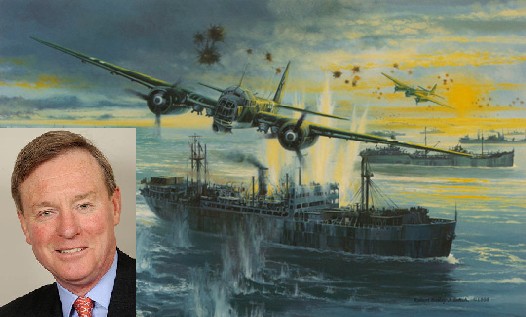 Andrew Robathan – whose photograph is inserted in Robert Bailey’s magnificent painting “Arctic Encounter” depicting a scene of ships from the famous scattered convoy PQ17 being attacked by a Junker Ju-88 bomber – is a rarity amongst present day British politicians in that he is man who not only has served in the armed forces but has also seen active service.
Andrew Robathan – whose photograph is inserted in Robert Bailey’s magnificent painting “Arctic Encounter” depicting a scene of ships from the famous scattered convoy PQ17 being attacked by a Junker Ju-88 bomber – is a rarity amongst present day British politicians in that he is man who not only has served in the armed forces but has also seen active service.
Mr Robathan served in the Coldstream Guards from 1974–89, but also served with the Special Air Service (SAS). He left the Army and worked for BP from 1991–92, but volunteered to return between January and April 1991 during the First Gulf War, serving as chief of staff of the Prisoner of War Guard Force in Saudi Arabia, Iraq and Kuwait.
Mr Robathan is a Parliamentary Under Secretary of State at the Ministry of Defence and Minister for Veterans.
It therefore comes as a surprise – and also a sadness – that the British Gazette has to take the gallant member for South Leicestershire to task for an outrageous attitude towards some of the bravest servicemen and merchant seamen of World War Two.
These are those 3,000 who served on the perilous “Russian Convoys” – which provided those absolutely vital supplies to the Russians during those dark days of 1942. It was the sacrifice of these brave men who made the Russian victories of Stalingrad and Kursk possible.
The Russians awarded these men (both Royal and Merchant navies) a special campaign medal to commemorate their bravery and service. The attitude of the British Admiralty and later Ministry of Defence has been desultory as they have never issued a campaign medal for these men, of now only a few survive.
Explaining the reasons for not issuing the “Arctic Star” campaign medal, he said the UK awarded medals only for “…..risk and rigour….” and that “…authoritarian regimes and dictators often throw around a lot of medals…..”
Unsurprisingly, these crass, ignorant and insulting comments have brought forth the wrath of the Russians – and justifiably so!
What makes the comments worse is Mr Robathan’s military service. Had they been made by a twenty something Commons researcher with a degree in Politics and Media Studies from a former polytechnic one could dismiss it as the prattling of a child. But these come from a former solider who himself has been “up against the enemy.”
The British Gazette deprecates Mr Robathan’s comments and calls for him to retract them. A change in policy on the Arctic Medal would also be welcome.
Speaking the Truth unto the Nation

Hmmm.
Mr. Robathan is a very pleasant and affable man but, it seems, not terribly well informed. We recently exchanged views on the subject of a new national anthem for England.
Mr. Robathan’s support lay with the adoption of William Blake’s ‘Jerusalem’, until I mentioned that this rather cloying musical epistle was a religious hymn and not an anthem.
I am therefore not surprised by his reported attitude to the Arctic veterans. Irrespective of conscience, he is merely supporting the Govt. line.
My interest in this matter is not just Mr. Robathan’s convenient thinking, but more the memory of a cousin on the maternal side who, driven mad by his experience of life on the ocean wave whilst tethered to a liferaft in the middle of the Arctic, was quietly placed in what used to be known as a lunatic asylum for the rest of his life.
John Green